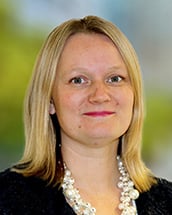A number of recent developments in Ukraine have demonstrated the country’s focus on promoting a blockchain friendly ecosystem.
- At a government level, the recently established Ministry of Digital Transformation (MDT) (available in Ukrainian only) is actively promoting a friendly regulatory environment for blockchain/cryptocurrency projects in Ukraine, in both the public and private sectors. To further this aim, the MDT has kicked off various initiatives in order to promote blockchain, including recently hosting a meeting (available in Ukrainian only) with all relevant stakeholders to discuss the status of various blockchain related workstreams, such as promoting changes in Ukrainian AML, licensing and tax legislation. In addition, the MDT has become the owner of many fragmented blockchain related projects that have been launched over the past 4-5 years. As a result of this, the MDT has suggested establishing a general framework under a Memorandum of Understanding (available in Ukrainian only), which was signed by a number of market stakeholders as well as the newly established inter-factional association of MPs called “Blockchain4Ukraine” (see below) and the Parliamentary Digital Transformation Committee. The MoU is aimed at promoting the use of blockchain technology and provides for the (i) implementation of the latest Financial Action Task Force Guidance on virtual assets; (ii) adoption of legal cryptocurrency jargon based on the European Central Bank’s approach; and (iii) adoption of a related tax regime.
- In addition, the MDT is also working to coordinate a number of collaborative efforts from various working parties which have become fragmented in the hope that this will produce tangible results within clear deadlines.
- In addition to the MDT and as mentioned above, a new inter-factional association called “blockchain4Ukraine” has been set up in the newly elected Ukrainian Parliament. The association, consisting of approximately 50 MPs, will collaborate to promote blockchain by working on blockchain related draft laws to be introduced to parliament.
We have also seen activity coming from outside government. In particular, the Blockchain Association of Ukraine (BAU) recently published its white paper (available in Ukrainian only) on the creation of a “Crypto Valley” type initiative in Ukraine. The White Paper sets out the BAU’s views on what Ukraine needs to do to compete in the global blockchain/crypto economy. In particular, according to the BAU, the promotion of blockchain in Ukraine has two major issues: one external and one internal. The external challenge is to implement the recent Financial Action Task Force Guidance on virtual assets into Ukrainian legislation to ensure that Ukraine keeps pace with the global market (and as noted above, this is one of the aims of the MoU put forward by the MDT). The internal challenge relates to scalability of the potential business. In particular, Ukraine remains a primarily cash based society due to comparatively low integration with the banking/financial ecosystem. Therefore, Ukraine will need infrastructural and societal changes to promote the use of transactions electronically if blockchain is to become more widely trusted and used by market participants.


